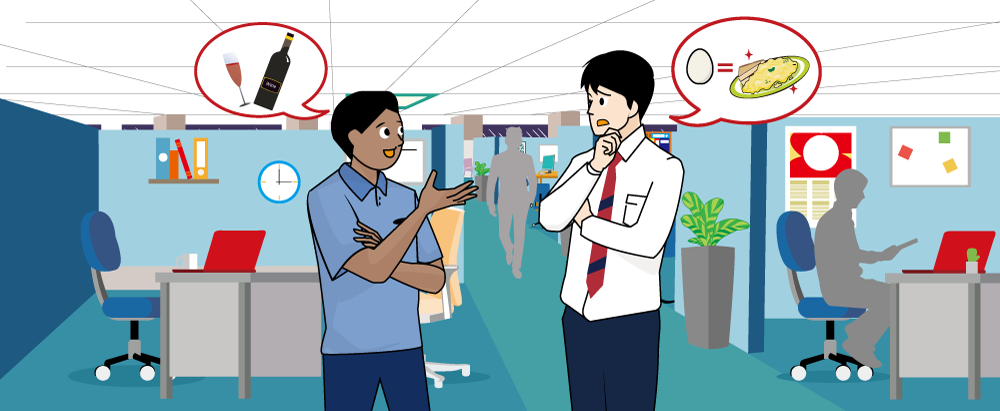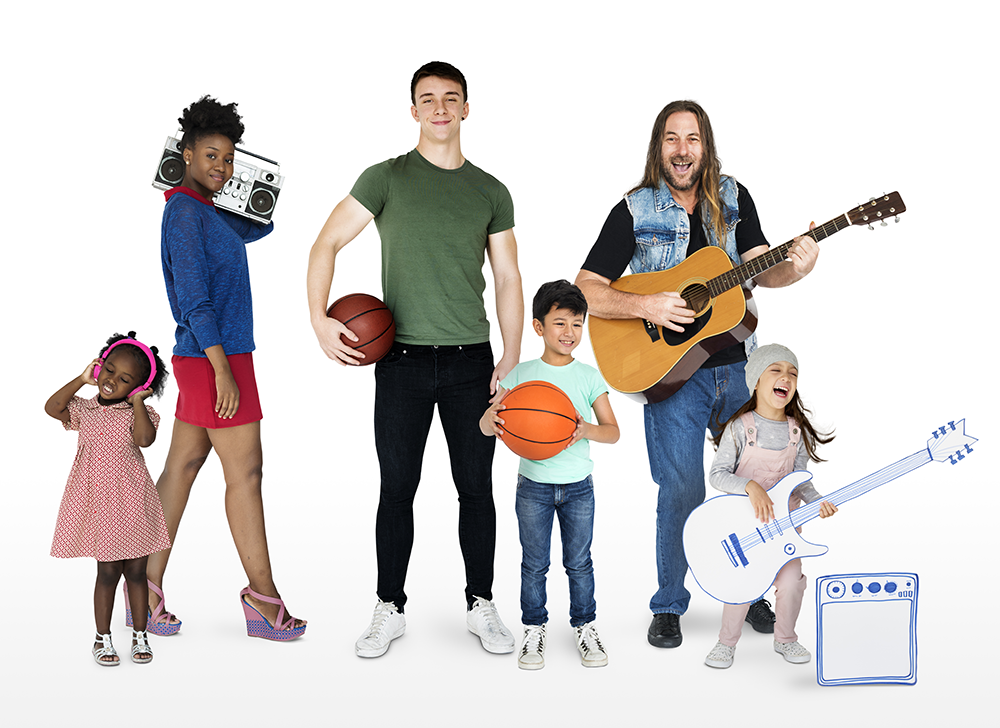Today's Point
今日のポイント
ポットラックとは、参加する人が料理や飲み物をなにか1つ持ち寄ってひらく「持ち寄りパーティ」のこと。
主催者が料理を全部準備するのではないので、気軽にパーティが楽しめるんです。
さて、ジェームズが日曜日にこのポットラックを開くそうです。
「スクランブルエッグしか作れない」というケンですが、「ワインを買ってくればいいんだよ」とホセのアドバイスに、ほっ。

Story of the Day
今日のストーリーRepeat after your teacher.
先生の後に続けて言ってみましょう。
| Jose : James is having a potluck at his house on Sunday. | ホセ : ジェームズが日曜日に家で持ち寄りパーティをやるんだ。 |
|---|---|
| Jose : You should come, Ken! | ホセ : きみも来いよ、ケン! |
| Ken : A potluck? Sounds fun, but I don’t know... | ケン : 持ち寄りパーティ?楽しそうだけど、どうしようかな… |
| Ken : I can only cook scrambled eggs. | ケン : ぼくはスクランブルエッグしか作れないんだ。 |
| Jose : Oh, don’t worry about it. | ホセ : だいじょうぶさ。 |
| Jose : You can bring a bottle of wine. | ホセ : ワインを持ってくればいいんだよ。 |
| Ken : Really? | ケン : それでいいの? |
| Jose : Sure! I’m just getting snacks from the store. | ホセ : もちろん!ぼくは店でおつまみを買っていく予定だ。 |
| Ken : Oh. Well, I have a lot of homework. | ケン : ああ、でも宿題がいっぱいあって。 |
| Jose : Finish it on Saturday. | ホセ : 土曜日に済ませればいいさ。 |
| Jose : You can do it! I believe in you! | ホセ : できるって!きみならきっとできる! |
| Ken : Thanks, Jose. | ケン : ありがとう、ホセ。 |
Key Phrase
キーフレーズRepeat after your teacher.
先生の後に続けて言ってみましょう。
I can only cook scrambled eggs.
Vocabulary / Expressions
ボキャブラリーと表現Repeat after your teacher.
先生の後に続けて言ってみましょう。
| potluck [pɑˈtlʌk](名詞) | ポットラック、持ち寄りパーティ |
|---|---|
| worry(動詞) | 心配する |
| bottle(名詞) | 瓶 |
| finish(動詞) | 終える、終わる |
Exercise
エクササイズ ARead the conversation aloud with your teacher. Fill in the blanks with a, b and c.
After that, fill in the blanks with your own words and practice the conversation with your teacher.
下記の会話の空欄に、a, b, cそれぞれの言葉を入れて、先生と一緒に音読してみましょう。
そのあと、空欄に入る言葉を自分で考えて、先生と会話をしてみましょう。

| Jose : James is having a potluck at his house on Sunday. | ホセ : ジェームズが日曜日に家で持ち寄りパーティをやるんだ。 |
|---|---|
| Ken : A potluck? Sounds fun. | ケン : 持ち寄りパーティ?楽しそうだね。 |
| Ken : I can ________ (a. prepare a salad b. bring some drinks c. put together a simple dish). | ケン : ぼくは(a. サラダを作れるよ b. 飲み物を持って来れるよ c. 簡単な料理を作れるけど)。 |
| Jose : That’s great. | ホセ : それはいいね。 |
| Jose : I’m just ________ (a. bringing b. buying c. taking) snacks from the store. | ホセ : ぼくはお店でおつまみを(a. 買って持っていく予定だよ b. 買う予定だよ c. 買っていく予定だよ)。 |
Exercise
エクササイズ B (Vocabulary Building)Choose the correct word from the box.
空欄に当てはまる言葉を選んで文章を完成させてください。
- potluck
- worry
- bottle
- finish
- There is some water in the ____________.
- I didn’t ____________ my salad.
- On Saturday can you bring some pasta for the _____________?
- My parents often ______________ about me.
Exercise
エクササイズ CSituation : Talk about a sport or musical instrument you can play.
ロールプレイ : 自分ができるスポーツか弾ける楽器について話してください。


Extra Exercise
Try the Extra Exercises. As with Exercise A, become familiar with some of these more advanced phrases.
エクストラ・エクササイズに挑戦してみましょう。
エクササイズAと同じ要領で、より高度なフレーズを練習してみましょう。
I can only cook scrambled eggs.
| Sato: It’s too bad the deal didn’t go through. |
|---|
| Ken: Yeah. I was disappointed. |
| Ken: We (a. just couldn’t convince them b. could hardly get them to listen to us c. could only give them a small discount). |
| Sato: Can we (a. do better next time b. negotiate with our vendors to drop the price c. win them back with an alternative proposal)? |
| Ken: Absolutely! |
| Ken: After some brainstorming, we came up with a few ideas. |

- 〈get+…(人)+~(to-不定詞)〉は、「…に~させる」という意味の構文なので、We could hardly get them to listen to us.は「僕たちは彼らに耳を傾けさせることもできなかった」という意味になります。 hardlyは「ほとんど~ない」「少しも~ない」。他にも、How can I get him to like my plan?「どうやって彼に私のプランを好きにさせることができるでしょうか?」 のように使います。
- win ~backは「~を取り戻す/取り返す」、come up withは「アイデアなどを思いつく」。